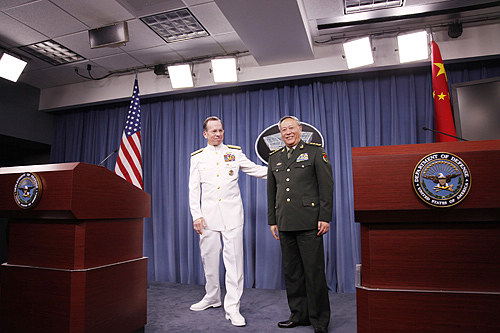|
 |
|
FOSTERING TRUST: Chen Bingde, Chief of the PLA General Staff, attends a joint press conference with Mike Mullen, Chairman of the U.S. Joint Chiefs of Staff, at the Pentagon on May 18 (WANG FENGFENG) |

Chen Bingde, Chief of the General Staff of the People's Liberation Army (PLA), paid an official visit to the United States on May 15-22, soon after this year's Sino-U.S. Strategic and Economic Dialogue in Washington, D.C., during which the two sides discussed military security for the first time. This was a breakthrough visit that will have a deep and profound impact on the two countries' military exchanges and overall relationship. The last visit by a chief of the PLA general staff to the United States was made by Chen's predecessor Liang Guanglie seven years ago.
Overcoming obstacles
The Sino-U.S. military relationship has, for the most part, been a fragile one. It is a sensitive and the most substantial part of their bilateral relationship and acts as an indicator of their overall relations. As the largest developing nation and the largest developed nation, respectively, China and the United States are major players on the world stage and must take joint responsibility for maintaining world peace through cooperation. This cooperation has been, at best, bumpy. The root of conflicts between the two lies in U.S. strategic thinking and its hegemonic acts, which have repeatedly damaged the Sino-U.S. military relationship.
On the one hand, military exchanges serve the interests of bilateral relations. The two sides therefore need to cautiously position their military relationship. On the other hand, if they cannot find common ground in their diplomatic relations, they will not share a healthy military relationship.
Recently, Sino-U.S. relations have warmed up following top leaders' state visits to each other. The two countries now face good opportunities to revitalize their bilateral military relationship.
During a visit to the United States in January, Chinese President Hu Jintao and U.S. President Barack Obama agreed to build a "cooperative partnership based on mutual respect and mutual benefit."
Against this backdrop, Chen suggested establishing a "new-type" military relationship between the two sides during his recent U.S. visit. This relationship, based on mutual respect, cooperation and reciprocity, should have the following characteristics: equality, close dialogue and communication, mechanisms guaranteeing its development, and efforts to eliminate obstacles such as U.S. arms sales to Taiwan, air and sea surveillance operations off China's coast and restrictions on the export of hi-tech products.
Showing respect
China has done much to ensure that bilateral military relations head in a healthy and stable direction. For example, it issues a national defense white paper every two years, reports to the UN Standardized Instrument for Reporting Military Expenditures and submits data to the UN Register of Conventional Arms. It also invited high-ranking U.S. military officials, like U.S. Secretary of Defense Robert Gates, to visit China.
Likewise, the U.S. side also made positive gestures in its latest National Security Strategy. The 2010 report said the United States will pursue a "positive, constructive and comprehensive relationship" with China, while welcoming China to a leadership role in the world. The United States hopes to deepen bilateral military relations and expand common interests by boosting cooperation through jointly striking pirates off the coast of Africa and preventing the proliferation of weapons of mass destruction.
The Sino-U.S. military relationship, however, has long been prone to fluctuations because Washington's commitment to this relationship usually stays on the verbal level. It often ignores China's aspirations and even goes as far as challenging China's core interests.
|
